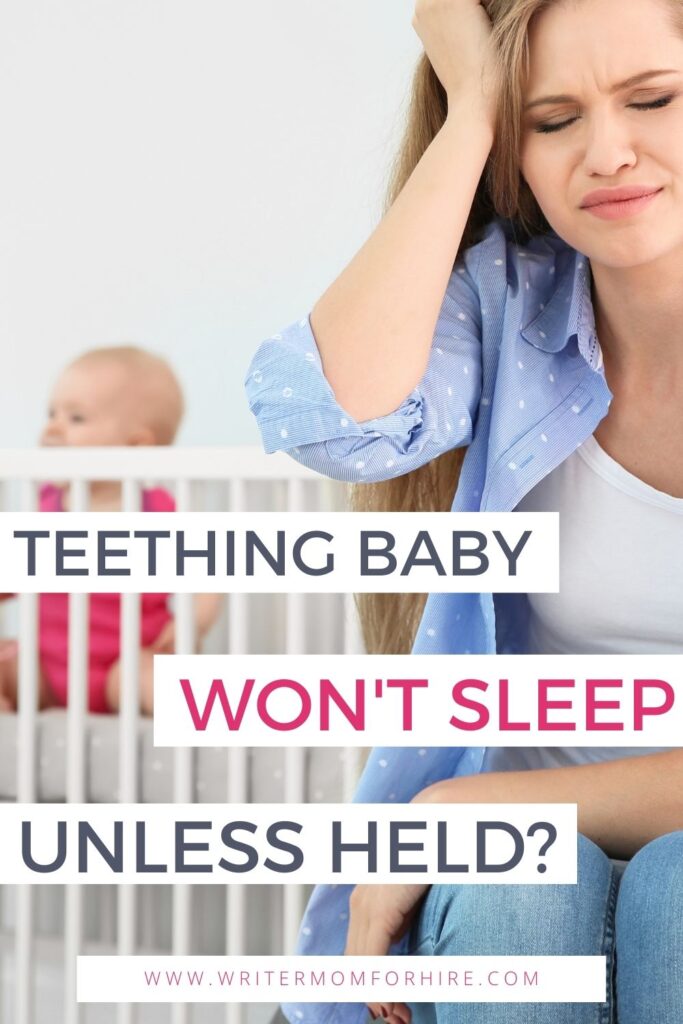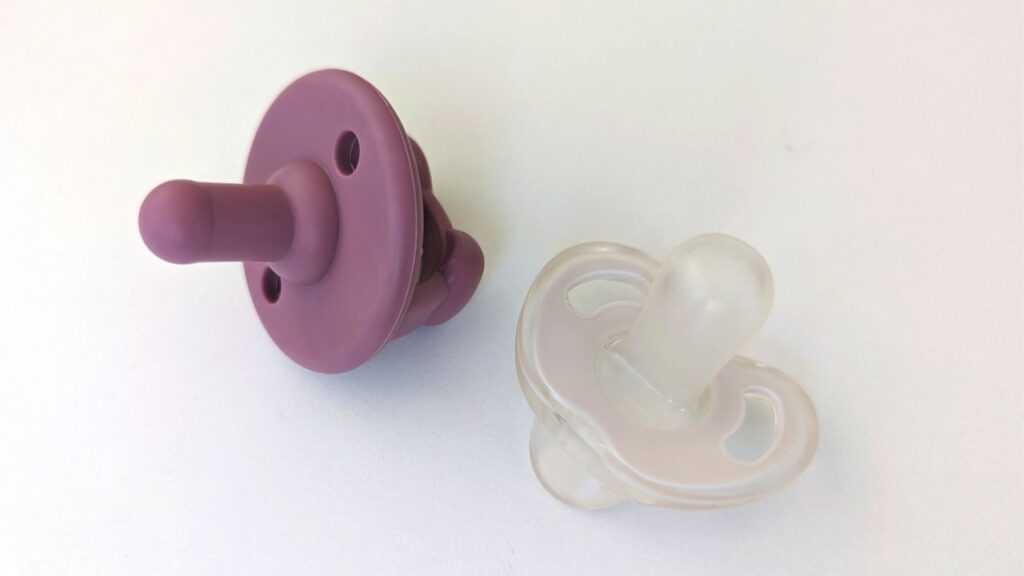Teething Baby Won’t Sleep Unless Held: 3 Things to Do
This post may contain affiliate links and we may earn commissions when you make a purchase through these links (at no extra cost to you). See our disclosure policy for more details.
How to Help When Your Teething Baby Won’t Sleep
Teething baby won’t sleep unless held? Is your baby’s teething pain worse at night? As excited as I was to have a second baby, I dreaded having to go through the teething process again.
My first daughter started showing signs of teething at five months old and cut her first tooth at six months. But there was only one day — the day before it erupted — that she was really miserable.
Actually, I enjoyed the baby snuggles. It was the same thing each time she got a new tooth…just one miserable day, then back to normal.
Some people don’t even know their baby is teething until there is a new tooth, which must be nice!
Now my second daughter just turned one, and she has six teeth. She started teething at three months old, and has been working on new teeth pretty much non-stop since then.
This last tooth was the worst, though. Not only was it painful for her, but it completely drained me.
So I understand what you’re going through. Your teething baby won’t sleep unless held, and you don’t know what to do.
In this article, we’ll talk about the signs that your baby might be teething, as well as tips for helping him or her (and you!) get through this difficult time.

1. Soothe Your Baby in the Early Stages of Teething
During the early stages of teething, babies are sometimes a little uncomfortable and have difficulty sleeping. And, sadly, it can get progressively more painful as the tooth gets closer to erupting.
Here are some ways you can soothe your baby in the early stages of teething:
- Give them silicone teething toys to chew on.
- Rub their gums with a clean finger.
- Give them frozen fruit in a mesh feeder (if old enough).
- Give them teething biscuits (if old enough).
- Freeze a wet washcloth for baby to chew on.
- Give lots of snuggles when needed.
- If you’re breastfeeding, feed baby on demand.
- Dry the drool frequently to prevent rash.
I wish I had heard about these silicone baby teething tubes when my girls were teething (have you tried them yet?!). I’ve heard good things about them! If we have another baby, I’m definitely going to give them a try.
Quick Update: I found that Baby #3 loved sucking on a silicone pacifier like Itzy Ritzy or Tommee Tippee Ultra Light that had been chilled in the freezer. It was safe because the silicone doesn’t get hard when frozen, and it doesn’t stay cold very long, so your baby can continue sucking on it without freezing their little mouth.

2. Avoid These Three Things
There are a few products that have been commonly used to help with teething pain in the past, although they could potentially be dangerous.
Teething tablets
We avoid the use of numbing gels and homeopathic teething tablets in our house, due to safety concerns.
We actually had a bottle of teething tablets on hand when our firstborn was a baby, but they were recalled around the time she started teething (thankfully, we hadn’t used any yet).
Numbing gel
The numbing gels also contain ingredients that could be harmful to babies (learn more). And they can numb your baby’s tongue, which poses a choking hazard, especially with younger babies.
Chewing on teething rings can help, although you need to take some precautions with those too. Liquid-filled teething toys could potentially leak or break open, so keep a close eye on them.
They can be put in the refrigerator, but avoid freezing them; they can become too hard and hurt your baby’s gums.
Amber necklaces
This should go without saying, but never tie a teething toy around your baby’s neck!
“But what about amber teething necklaces?” you’re asking.
We don’t use them, but if you choose to, do your research first. Your baby shouldn’t be able to chew on an amber necklace, and always remove it when putting your baby down for a nap and at bedtime.
Here is why the FDA advises against the use of wearing teething jewelry on babies.
3. Help Your Baby Sleep When Teething
Finally, the reason you’re really here: how to help your baby sleep better when they’re teething.
What Helps a Teething Baby Sleep?
Here are a few tips to help you get through the worst part of teething.
- If your baby has trouble sleeping, give infant acetaminophen or ibuprofen just before bedtime (talk to your child’s doctor about dosage).
- If your baby has trouble nursing, give something to chew on (teether, chilled washcloth, etc.) before a feed, or just rub the gums.
- If your baby wakes up the second you set him/her down for a nap or at bedtime, try wearing your baby in a baby wrap or carrier.
Truthfully, I have a hard time getting medicine into my baby — half the time, she gags and throws it back up. And when in the worst part of teething, some babies don’t even want to chew on a teething toy.
It’s worth a shot, though. Hopefully these ideas help you if your teething baby won’t sleep!
But sometimes, you just have to put the laundry and dishes on hold, sit down, and hold your baby.
The teething will be over soon, and you can get caught up on housework later. Sometimes, they just need the snuggles.
Enjoy cuddling with your baby while he or she sleeps (and read a book, watch a movie, play on your phone…or take a nap if you can).
Related: 21 Incredible Benefits of Babywearing
At What Age Do Babies Start Teething?
Babies typically get their first tooth around six months old, but it can vary quite a bit from one baby to another. Some babies start teething at two months old.
Often, they will show signs of teething around three to five months old, but the teething process can take quite a while.
Some babies don’t get their first tooth until closer to their first birthday, but most babies get it anywhere in between six and twelve months.
Both of my babies got their first tooth around six months of age. There could be a family pattern of “early”, “average”, and “late” teethers, as some dentists have noted.
The teething process takes a couple of years (yay!). Toddlers should end up with a total of twenty baby (or “milk”) teeth, including their two-year molars.
Can Teething Disturb a Baby’s Sleep?
When teeth are moving and cutting through the gums, it’s uncomfortable (and sometimes downright painful). This can lead to many nights of sleeplessness for not only baby, but for you as well.
Fortunately, it doesn’t last forever — and there are ways to help your baby through this difficult time. First, let’s figure out if it’s teething or something else, and then we’ll discuss some ways to soothe teething pain.
Signs of Teething: Is it Teething or Something Else?
Babies can have a wide range of experiences when teething. Some have no trouble at all, while others are miserable until the new tooth emerges.
If your baby is around six months and starts to show some of these symptoms, it’s possible that she’s teething.
Early signs of teething include:
- drooling
- rash on face
- chewing on everything
- fussiness
When my daughter first started teething at three months, I noticed that she was drooling a ton and constantly chewed on my fingers or whatever she could get into her mouth.
She was noticeably fussier than she had been previously. Babies can be fussy for a number of reasons, and putting things in their mouth is just one way they learn about the world around them.
But if you notice that your baby’s shirt is always soaked and it hurts when she gnaws on your fingers, she could be in the early stages of teething.
Other signs of teething can include:
- difficulty sleeping
- loss of appetite
- low-grade fever
- pulling on ears
- diaper rash
- mucus in stool
- flushed cheeks
- more clingy/cranky than usual
- swollen gums
I noticed that, as she gets closer to cutting a new tooth, my infant has difficulty sleeping at night and gets really clingy. It’s obvious that she’s teething because I can see the white spots beneath her swollen gums.
If you can’t see them, though, it can be more difficult to determine whether your baby is teething or there is something else wrong.
If you think something is wrong, but aren’t sure if your baby is teething or not, consult with your pediatrician.
Is it Normal for Teething Babies to Cry a Lot?
Yes, unfortunately, it is totally normal for teething babies to cry a lot.
The day (or week) before a tooth erupts can be miserable, not only for your baby, but for you as well. You might find yourself crying (a lot) along with your baby.
Remember, you’re not alone.
I know what it’s like to have a baby who screams every time you try to put her down, even for a second. Who refuses to eat. Who refuses to nurse — or perhaps, wants to nurse all day long.
Your baby is clingy and whiny. Needs to be held, even for naps, because lying down puts pressure on the already-painful gums.
She tosses and turns all night long, and you haven’t gotten more than a couple hours of sleep over the past few nights.
You get up and walk around, because walking and holding her upright is the only way she will stop crying and close her eyes. But you’re exhausted and can barely hold yourself upright.
You manage to get some medicine in her, and it provides a little relief — just enough for both of you to get a couple more hours of sleep.
Teething Baby Won’t Sleep Unless Held?
Remember, it won’t last forever. In the moment, it sure feels like it. I wish I had a magical cure to share with you (I’ll be sure to update this post if I come across one!).
I hope, for your sanity, that you have someone around who can give you a break during this time. However, if you are the kids’ primary caregiver, you might not have anyone to relieve you, even for a little while.
My best advice is to focus on the light at the end of the tunnel. When the tooth finally pushes its way through her gums, you will have a happy baby again.
Read More:
Best Advice for a New Parent: Readers Share Their Favorite Parenting Tips








It has been a few years since the teething stage for us. We are actually waiting for the first tooth to fall out for the first visit from the tooth fairy. This article is very thorough and nighttime is always the worst. Some of the things we used were to cut the edges of a Pediasure Popsicle and poke a tiny hole in it…encourages them to chew on it and soothes the gums.
Teething is such a tough time for little ones and their parents. You gave the best advice at the end. Snuggle with those little ones. It’s the best thing you can do. They are only little for a while. That other housework will still be there…..waiting…..and that’s OK.
Teething can be the worst!! Good tips for helping parents through a tough time.
Interesting! We have never tried a Pediasure Popsicle. It would definitely be worth considering….
It’s been many years since I’ve had littles, but I do remember the pain caused by those teeth. I also remember when I was able to cuddle them and help them feel better. My kiddos are 21, 24, 27, and 30 now. I miss when they were little, but do have a different kind of fun now. Thanks for sharing. Your pictures are soooo sweet!!
I try really hard to enjoy the baby stage, although I can’t lie–I definitely prefer the toddler stage. Two and three year olds are definitely challenging in a different way, but so much more fun!